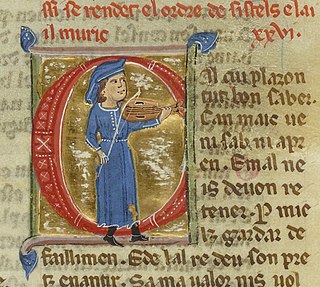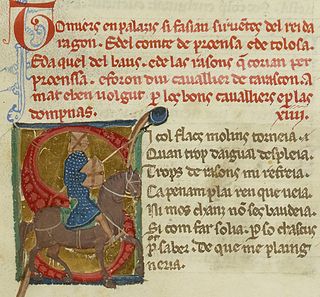This page is based on this
Wikipedia article Text is available under the
CC BY-SA 4.0 license; additional terms may apply.
Images, videos and audio are available under their respective licenses.

A troubadour was a composer and performer of Old Occitan lyric poetry during the High Middle Ages (1100–1350). Since the word troubadour is etymologically masculine, a female troubadour is usually called a trobairitz.
Occitan literature is a body of texts written in Occitan, mostly in the south of France. It was the first literature in a Romance language and inspired the rise of vernacular literature throughout medieval Europe. Occitan literature's Golden Age was in the 12th century, when a rich and complex body of lyrical poetry was produced by troubadours writing in Old Occitan, which still survives to this day. Although Catalan is considered by some a variety of Occitan, this article will not deal with Catalan literature, which started diverging from its Southern French counterpart in the late 13th century.
Fulk is an old European personal name, probably deriving from the Germanic folk. It is cognate with the French Foulques, the Italian Fulco and the Swedish Folke, along with other variants such as Fulke, Foulkes, Fulko, Folco, Folquet, and so on.

Gaucelm Faidit was a troubadour, born in Uzerche, in the Limousin, from a family of knights in service of the count of Turenne. He travelled widely in France, Spain, and Hungary. His known patrons include Geoffrey II, Duke of Brittany and Dalfi d'Alvernha; he was at one time in Poitiers at the court of Richard I of England, for whose death he wrote a famous planh (lament) in 1199. It is possible, but controversial, that Gaucelm took part in the Third Crusade from 1189–1191; it seems clear that in 1202 he set out on the Fourth Crusade, as did his current patron, Boniface of Montferrat. After 1202 there is no further historical trace of him.

Tomier and Palaizi were two knights and troubadours from Tarascon, possibly brothers, and frequent comrades and co-composers.

Elias de Barjols was a bourgeois Aquitainian troubadour who established himself in Provence and retired a monk. Eleven of his lyrics survive, but none of his music.

Bertran del Pojet was a Provençal castellan and troubadour of the latter half of the thirteenth century, a period of Angevin rule in Provence and Italy.

Guilhem Rainol d'At was a minor Provençal troubadour from Apt in the Vaucluse.
William I of Baux was the Prince of Orange from 1182 until his death. He was an important Provençal nobleman.
Bertran de Born, called lo Filhs, was a Limousin knight and troubadour. He wrote two sirventes and has three other works attributed to him. He participated in the wars of John Lackland in France.
Bertran de Gourdon or Bertram de Gordon was the lord of Gourdon, a knight and troubadour.
Bertran Folcon d'Avignon or Bertran Folco d'Avinhon was a Provençal nobleman and troubadour from Avignon. He was a faithful partisan of Raymond VI and Raymond VII of Toulouse in Provence, and participated in the wars against the Albigensian Crusade. He was inside the city during the siege of Beaucaire in 1216. In 1226 Raymond VII appointed him bailiff of Avignon.
Nationality words link to articles with information on the nation's poetry or literature.
Gouffier of Lastours was a knight from Lastours in the Limousin in France, who participated in the First Crusade. He was lord of the Château de Lastours, near Nexon, Haute-Vienne.
Duran Sartor de Paernas or Duran Sartre de Carpentras was a Provençal troubadour from Pernes near Carpentras. The nickname sartor means "tailor". Two sirventes have been attributed to him, both reflect opposition to the royal crusade in Occitania: "Vil sirventes leugier e venassal" was written towards 1210, certainly before 1220, and "En talent ai qu'un sirventes encoc," which was written in 1242, during the Saintonge War. Although Duran criticises the crusade against alleged heretics, he encourages further efforts at crusading against Muslims.







